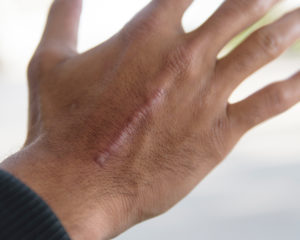Scarring: An Unpleasant Side-Effect of Healing
- Posted on: Oct 15 2017
 To suffer a wound is an initial trauma that we can often make sense of, after the fact. But when scars remain after said injury, whether from an accident or a surgical procedure, this can feel like a second-slap; an unnecessary and unpleasant after effect that must now be dealt with. Keloid scars, which are darkened and raised, may at some point feel as bad as the original wound.
To suffer a wound is an initial trauma that we can often make sense of, after the fact. But when scars remain after said injury, whether from an accident or a surgical procedure, this can feel like a second-slap; an unnecessary and unpleasant after effect that must now be dealt with. Keloid scars, which are darkened and raised, may at some point feel as bad as the original wound.
What causes a Keloid?
Almost anytime we wound the skin a scar will develop. This happens as a result of excess collagen, the protein that is produced by the body to heal injuries. We need this to happen, but sometimes it just happens to go too far. Keloids result from an over-growth of collagen during the healing process, though the prominence of the scar may not be obvious for several months. These scars are unique in that their growth may cause them to extend beyond the original borders of the injury.
A keloid scar does not increase one’s risk for skin cancer, nor any other medical dermatology concern. However, due to cosmetic concerns, any people do choose to obtain treatment to reduce the appearance of such a scar. Treatment may also be obtained to improve range of motion and comfort in the area surrounding this enlarged scar.
Treatment Options for Keloid Scars
The complex nature of keloid scars is exactly what prompts people to seek treatment for reduction. This same complexity, however, makes treatment a more involved process than treating a standard scar. The risk that we want to work around is the potential for another keloid scar to form as a result of the first keloid scar treatment. This is why scar treatment of such magnitude should only be performed by an experienced dermatologic surgeon.
There is no singular “best” way to treat every keloid scar. The type of therapy that we recommend is based on some factors, including patient age, the location of the scar, and its extensiveness. Laser treatments may work in some instances, where freezing the keloid with liquid nitrogen may be more appropriate in others.
Keloid scars are a challenge, but your dermatologist in Leeds, West Yorkshire seeks to find appropriate methods of reduction that will work in your unique situation. Contact us to learn more about scar treatments offered by Dr. Hussain.
Posted in: Scar Revision

